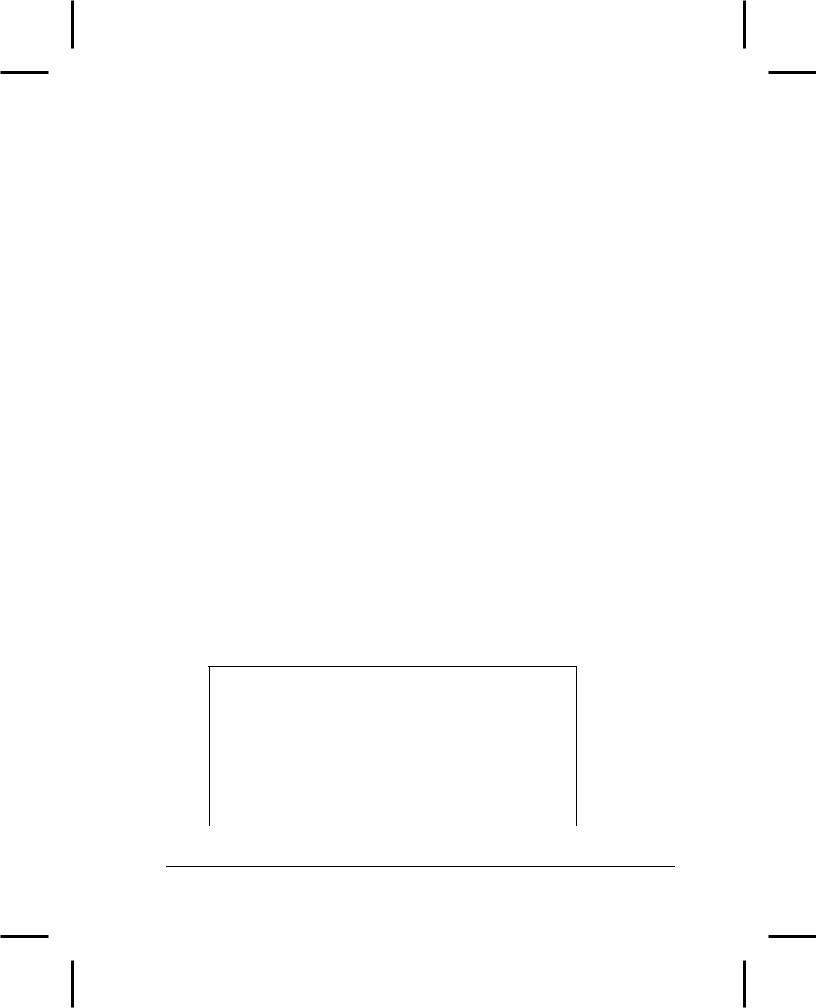
- •Thinking in C++ 2nd edition Volume 2: Standard Libraries & Advanced Topics
- •Preface
- •What’s new in the second edition
- •What’s in Volume 2 of this book
- •How to get Volume 2
- •Prerequisites
- •Learning C++
- •Goals
- •Chapters
- •Exercises
- •Exercise solutions
- •Source code
- •Language standards
- •Language support
- •The book’s CD ROM
- •Seminars, CD Roms & consulting
- •Errors
- •Acknowledgements
- •Library overview
- •1: Strings
- •What’s in a string
- •Creating and initializing C++ strings
- •Initialization limitations
- •Operating on strings
- •Appending, inserting and concatenating strings
- •Replacing string characters
- •Concatenation using non-member overloaded operators
- •Searching in strings
- •Finding in reverse
- •Finding first/last of a set
- •Removing characters from strings
- •Stripping HTML tags
- •Comparing strings
- •Using iterators
- •Iterating in reverse
- •Strings and character traits
- •A string application
- •Summary
- •Exercises
- •2: Iostreams
- •Why iostreams?
- •True wrapping
- •Iostreams to the rescue
- •Sneak preview of operator overloading
- •Inserters and extractors
- •Manipulators
- •Common usage
- •Line-oriented input
- •Overloaded versions of get( )
- •Reading raw bytes
- •Error handling
- •File iostreams
- •Open modes
- •Iostream buffering
- •Seeking in iostreams
- •Creating read/write files
- •User-allocated storage
- •Output strstreams
- •Automatic storage allocation
- •Proving movement
- •A better way
- •Output stream formatting
- •Internal formatting data
- •Format fields
- •Width, fill and precision
- •An exhaustive example
- •Formatting manipulators
- •Manipulators with arguments
- •Creating manipulators
- •Effectors
- •Iostream examples
- •Code generation
- •Maintaining class library source
- •Detecting compiler errors
- •A simple datalogger
- •Generating test data
- •Verifying & viewing the data
- •Counting editor
- •Breaking up big files
- •Summary
- •Exercises
- •3: Templates in depth
- •Nontype template arguments
- •Typedefing a typename
- •Using typename instead of class
- •Function templates
- •A string conversion system
- •A memory allocation system
- •Type induction in function templates
- •Taking the address of a generated function template
- •Local classes in templates
- •Applying a function to an STL sequence
- •Template-templates
- •Member function templates
- •Why virtual member template functions are disallowed
- •Nested template classes
- •Template specializations
- •A practical example
- •Pointer specialization
- •Partial ordering of function templates
- •Design & efficiency
- •Preventing template bloat
- •Explicit instantiation
- •Explicit specification of template functions
- •Controlling template instantiation
- •Template programming idioms
- •Summary
- •Containers and iterators
- •STL reference documentation
- •The Standard Template Library
- •The basic concepts
- •Containers of strings
- •Inheriting from STL containers
- •A plethora of iterators
- •Iterators in reversible containers
- •Iterator categories
- •Input: read-only, one pass
- •Output: write-only, one pass
- •Forward: multiple read/write
- •Bidirectional: operator--
- •Random-access: like a pointer
- •Is this really important?
- •Predefined iterators
- •IO stream iterators
- •Manipulating raw storage
- •Basic sequences: vector, list & deque
- •Basic sequence operations
- •vector
- •Cost of overflowing allocated storage
- •Inserting and erasing elements
- •deque
- •Converting between sequences
- •Cost of overflowing allocated storage
- •Checked random-access
- •list
- •Special list operations
- •list vs. set
- •Swapping all basic sequences
- •Robustness of lists
- •Performance comparison
- •A completely reusable tokenizer
- •stack
- •queue
- •Priority queues
- •Holding bits
- •bitset<n>
- •vector<bool>
- •Associative containers
- •Generators and fillers for associative containers
- •The magic of maps
- •A command-line argument tool
- •Multimaps and duplicate keys
- •Multisets
- •Combining STL containers
- •Creating your own containers
- •Summary
- •Exercises
- •5: STL Algorithms
- •Function objects
- •Classification of function objects
- •Automatic creation of function objects
- •Binders
- •Function pointer adapters
- •SGI extensions
- •A catalog of STL algorithms
- •Support tools for example creation
- •Filling & generating
- •Example
- •Counting
- •Example
- •Manipulating sequences
- •Example
- •Searching & replacing
- •Example
- •Comparing ranges
- •Example
- •Removing elements
- •Example
- •Sorting and operations on sorted ranges
- •Sorting
- •Example
- •Locating elements in sorted ranges
- •Example
- •Merging sorted ranges
- •Example
- •Set operations on sorted ranges
- •Example
- •Heap operations
- •Applying an operation to each element in a range
- •Examples
- •Numeric algorithms
- •Example
- •General utilities
- •Creating your own STL-style algorithms
- •Summary
- •Exercises
- •Perspective
- •Duplicate subobjects
- •Ambiguous upcasting
- •virtual base classes
- •The "most derived" class and virtual base initialization
- •"Tying off" virtual bases with a default constructor
- •Overhead
- •Upcasting
- •Persistence
- •MI-based persistence
- •Improved persistence
- •Avoiding MI
- •Mixin types
- •Repairing an interface
- •Summary
- •Exercises
- •7: Exception handling
- •Error handling in C
- •Throwing an exception
- •Catching an exception
- •The try block
- •Exception handlers
- •Termination vs. resumption
- •The exception specification
- •Better exception specifications?
- •Catching any exception
- •Rethrowing an exception
- •Uncaught exceptions
- •Function-level try blocks
- •Cleaning up
- •Constructors
- •Making everything an object
- •Exception matching
- •Standard exceptions
- •Programming with exceptions
- •When to avoid exceptions
- •Not for asynchronous events
- •Not for ordinary error conditions
- •Not for flow-of-control
- •You’re not forced to use exceptions
- •New exceptions, old code
- •Typical uses of exceptions
- •Always use exception specifications
- •Start with standard exceptions
- •Nest your own exceptions
- •Use exception hierarchies
- •Multiple inheritance
- •Catch by reference, not by value
- •Throw exceptions in constructors
- •Don’t cause exceptions in destructors
- •Avoid naked pointers
- •Overhead
- •Summary
- •Exercises
- •8: Run-time type identification
- •The “Shape” example
- •What is RTTI?
- •Two syntaxes for RTTI
- •Syntax specifics
- •Producing the proper type name
- •Nonpolymorphic types
- •Casting to intermediate levels
- •void pointers
- •Using RTTI with templates
- •References
- •Exceptions
- •Multiple inheritance
- •Sensible uses for RTTI
- •Revisiting the trash recycler
- •Mechanism & overhead of RTTI
- •Creating your own RTTI
- •Explicit cast syntax
- •Summary
- •Exercises
- •9: Building stable systems
- •Shared objects & reference counting
- •Reference-counted class hierarchies
- •Finding memory leaks
- •An extended canonical form
- •Exercises
- •10: Design patterns
- •The pattern concept
- •The singleton
- •Variations on singleton
- •Classifying patterns
- •Features, idioms, patterns
- •Basic complexity hiding
- •Factories: encapsulating object creation
- •Polymorphic factories
- •Abstract factories
- •Virtual constructors
- •Destructor operation
- •Callbacks
- •Observer
- •The “interface” idiom
- •The “inner class” idiom
- •The observer example
- •Multiple dispatching
- •Visitor, a type of multiple dispatching
- •Efficiency
- •Flyweight
- •The composite
- •Evolving a design: the trash recycler
- •Improving the design
- •“Make more objects”
- •A pattern for prototyping creation
- •Trash subclasses
- •Parsing Trash from an external file
- •Recycling with prototyping
- •Abstracting usage
- •Applying double dispatching
- •Implementing the double dispatch
- •Applying the visitor pattern
- •More coupling?
- •RTTI considered harmful?
- •Summary
- •Exercises
- •11: Tools & topics
- •The code extractor
- •Debugging
- •Trace macros
- •Trace file
- •Abstract base class for debugging
- •Tracking new/delete & malloc/free
- •CGI programming in C++
- •Encoding data for CGI
- •The CGI parser
- •Testing the CGI parser
- •Using POST
- •Handling mailing lists
- •Maintaining your list
- •Mailing to your list
- •A general information-extraction CGI program
- •Parsing the data files
- •Summary
- •Exercises
- •General C++
- •My own list of books
- •Depth & dark corners
- •Design Patterns
- •Index

Now the output is
Cat()
Cat()
Cat()
PWrap constructor allocating a Dog ~Cat()
~Cat()
~Cat()
PWrap destructor inside handler
Again, the storage allocation for Dog throws an exception, but this time the array of Cat objects is properly cleaned up, so there is no memory leak.
Exception matching
When an exception is thrown, the exception-handling system looks through the “nearest” handlers in the order they are written. When it finds a match, the exception is considered handled, and no further searching occurs.
Matching an exception doesn’t require a perfect match between the exception and its handler. An object or reference to a derived-class object will match a handler for the base class. (However, if the handler is for an object rather than a reference, the exception object is “sliced” as it is passed to the handler; this does no damage but loses all the derived-type information.) If a pointer is thrown, standard pointer conversions are used to match the exception. However, no automatic type conversions are used to convert one exception type to another in the process of matching. For example,
//: C07:Autoexcp.cpp
// No matching conversions #include <iostream>
using namespace std;
class Except1 {}; class Except2 { public:
Except2(Except1&) {}
};
void f() { throw Except1(); }
int main() {
Chapter 16: Exception Handling
388

try { f();
}catch (Except2) {
cout << "inside catch(Except2)" << endl;
}catch (Except1) {
cout << "inside catch(Except1)" << endl;
}
} ///:~
Even though you might think the first handler could be used by converting an Except1 object into an Except2 using the constructor conversion, the system will not perform such a conversion during exception handling, and you’ll end up at the Except1 handler.
The following example shows how a base-class handler can catch a derived-class exception:
//: C07:Basexcpt.cpp
// Exception hierarchies #include <iostream> using namespace std;
class X |
{ |
|
public: |
|
|
class |
Trouble {}; |
|
class |
Small |
: public Trouble {}; |
class |
Big : |
public Trouble {}; |
void f() { throw Big(); }
};
int main() { X x;
try { x.f();
}catch(X::Trouble) {
cout << "caught Trouble" << endl;
// Hidden by previous handler:
}catch(X::Small) {
cout << "caught Small Trouble" << endl;
}catch(X::Big) {
cout << "caught Big Trouble" << endl;
}
} ///:~
Here, the exception-handling mechanism will always match a Trouble object, or anything derived from Trouble, to the first handler. That means the second and third handlers are never called because the first one captures them all. It makes more sense to catch the derived types
Chapter 16: Exception Handling
389

first and put the base type at the end to catch anything less specific (or a derived class introduced later in the development cycle).
In addition, if Small and Big represent larger objects than the base class Trouble (which is often true because you regularly add data members to derived classes), then those objects are sliced to fit into the first handler. Of course, in this example it isn’t important because there are no additional members in the derived classes and there are no argument identifiers in the handlers anyway. You’ll usually want to use reference arguments rather than objects in your handlers to avoid slicing off information.
Standard exceptions
The set of exceptions used with the Standard C++ library are also available for your own use. Generally it’s easier and faster to start with a standard exception class than to try to define your own. If the standard class doesn’t do what you need, you can derive from it.
The following tables describe the standard exceptions:
exception |
The base class for all the exceptions thrown |
|
by the C++ standard library. You can ask |
|
what( ) and get a result that can be |
|
displayed as a character representation. |
|
|
logic_error |
Derived from exception. Reports program |
|
logic errors, which could presumably be |
|
detected before the program executes. |
|
|
runtime_error |
Derived from exception. Reports runtime |
|
errors, which can presumably be detected |
|
only when the program executes. |
|
|
The iostream exception class ios::failure is also derived from exception, but it has no further subclasses.
The classes in both of the following tables can be used as they are, or they can act as base classes to derive your own more specific types of exceptions.
Exception classes derived from logic_error
domain_error |
Reports violations of a precondition. |
|
|
invalid_argument |
Indicates an invalid argument to the |
|
function it’s thrown from. |
|
|
length_error |
Indicates an attempt to produce an object |
|
whose length is greater than or equal to |
|
NPOS (the largest representable value of |
|
type size_t). |
|
|
Chapter 16: Exception Handling
390
